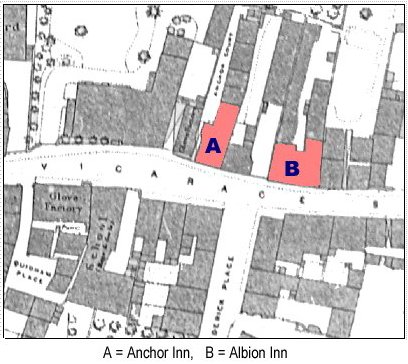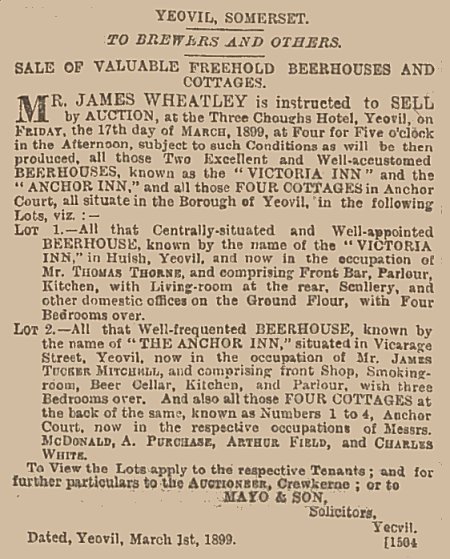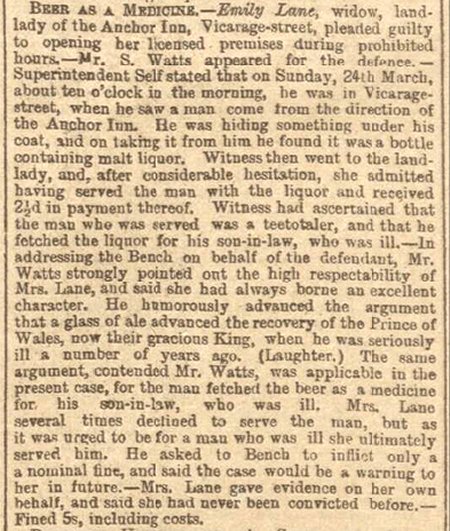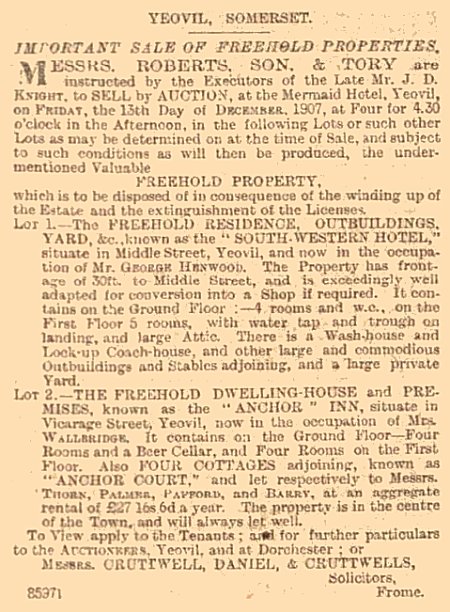The history of yeovil's pubs
PUBS HOME PAGE |
PUBS INTRODUCTION |
PUBS BY NAME |
BEERHOUSES |
anchor inn (2)
7 Vicarage Street
 I
could find very
little
information
about the Anchor
Inn (marked 'A'
on the map)
other than it
was located at 7
Vicarage Street.
To the western
side, between
the pub and a
small glove
factory, was a
narrow, twisting
alleyway that
opened up behind
the pub to
become
Anchor
Court, also
known as
Jenning's Court, one of
the many small
sub-standard
housing enclaves
in Yeovil at the
time.
I
could find very
little
information
about the Anchor
Inn (marked 'A'
on the map)
other than it
was located at 7
Vicarage Street.
To the western
side, between
the pub and a
small glove
factory, was a
narrow, twisting
alleyway that
opened up behind
the pub to
become
Anchor
Court, also
known as
Jenning's Court, one of
the many small
sub-standard
housing enclaves
in Yeovil at the
time.
The licensees span from at least 1850 until 1914 but none seem to have enjoyed a particularly long tenancy. It is interesting to note that at least four had additional occupations - Giles Hawkins (Glover), William Ricketts (Labourer), James Mitchell (Saddler and Shop Keeper) and Emily Lane (Glove Machinist).
In fact I believe that the Anchor Inn is another of those establishments that began life in the wake of the Beerhouse Act 1830 as a beerhouse. The first two records indicate it being a beerhouse, followed by a hiatus for ten years only after which it becomes named as the Anchor Inn. Whether it was ever rebuilt is not known, if it was it is likely to have been rebuilt by the brewery. In any event it appears that the Anchor Inn proved to be a good training ground for licensees of other establishments, with two moving on to other public houses in the town.
The Anchor Inn together with the four 'cottages' of Anchor Court were put up for auction in 1899 but remained unsold. The 1899 notice of sale described the accommodation of the inn as comprising a front shop, smoking room, beer cellar, kitchen and parlour with three bedrooms over. At this time it was occupied by licensee James Tucker Mitchell. The Anchor Inn together with the dwellings were subsequently bought by Jonathan Drew Knight, who was certainly the owner in 1906.
With the Licensing Act of 1904 (the Balfour Act) the intention of the government was to reduce the number of licensed premises and the standard of those remaining to be improved. To achieve this the grounds on which a license could be refused were extended. The justices could now refer cases which they considered to be outside their remit to the quarter sessions who could refuse licenses on almost any grounds, including the fact of there being more premises than required to suit the needs of custom. The act made provision for compensation of licensees deprived of their licenses based on the difference in value between the the house having a license and the value without one. In July 1906 the license of the Anchor Inn was refused by consent, subject to compensation.
The inn and court were sold again in 1907 following the death of Mr Knight and the sale notice simply described the accommodation as four rooms on the ground floor and a beer cellar with four rooms on the first floor. At this time the licensee was Mrs Wallbridge and the Anchor Inn and the four dwellings were bought by a Mr Wallbridge - presumably Emily's son - for £200 (about £115,000 at today's value).
![]()
The first two licensees, William Foot and Elizabeth Whilly are found in their respective censuses only. William Foot was born around 1809 at Sydling St Nicholas, Dorset, some dozen miles south of Yeovil. In 1850 he was listed as a Vicarage Street beer retailer in Hunt & Co's Directory and in the 1851 census he was listed as an innkeeper living with his wife, Anna, and sons William and James in Vicarage Street. William Foot died in the spring of 1848.
Elizabeth Whilly was born at Pendomer, some five miles southwest of Yeovil, around 1803. The only reference I could find for her was the 1861 census in which she appears as a 58-year old spinster who gave her occupation as beer house keeper.
Giles Hawkins, born in West Coker in 1849, was licensee with his wife Elizabeth by 1875 when he was 26 years old. By 1891 Giles, Elizabeth and their family were living next door to the Anchor Inn at No 8 Vicarage Street. Giles was listed as a leather dresser while next door, in the Anchor, was living the next licensee, William Ricketts.
Who'd have thought it? - two men called William Ricketts, both living in Yeovil in 1891 and both publicans; one at the Anchor Inn and the other at the Duke of Wellington in Sherborne Road. Little wonder that, without the benefit of easy internet access to the census returns, eminent Yeovil historians Leslie Brooke and Leonard Hayward confused them. The William Ricketts of the Anchor Inn was born around 1868 in Mudford, just northeast of Yeovil (the other William Ricketts was born about 1857 in Yeovil). He was the son of Yeovil-born shepherd Charles Ricketts and his Mudford-born wife, Ellen, who was a glover. In the 1871 census Charles and Ellen were living at Mudford Sock with their four young children of whom William, then aged five, was the eldest. By 1881 the family had moved to Preston Street (Preston Road) in Preston Plucknett and by this time William was an agricultural labourer. By 1891 William, by now aged 23, and his new bride, Alice, were at the Anchor Inn where William was licensee and was listed as a labourer and publican. I'm not sure what happened to Alice but by 1901 William had remarried and he and his new wife, Louisa, from Blackford and eight years his junior, were living at Brimsmore Cottages on the Ilchester Road just two cottages away from his parents and siblings. William described his occupation as a general haulier. The following year they were living at Yeovil Marsh where their first daughter, Rose, was born and two years later their second daughter, Lily, was born at Preston Plucknett. Their third daughter, Ellen, was born in 1906 at Vagg and they were living at Vagg Farm, just north of Yeovil, at the time of the 1911 census when William's occupation was a farm labourer. By 1914 one of the William Ricketts was licensee of the Royal Oak in Wine Street but I couldn't tell which one.
Hubert Beare was next licensee and his story is outlined at the Albion Inn.
James Tucker Mitchell was born in Long Sutton in the spring of 1850, the son of agricultural labourer George Mitchell and his wife, Emma.. By 1881 he was aged 31, unmarried, working as a saddler and living with his aunt and uncle in Long Sutton. By 1891 he was living in Bridport, Dorset, with his wife Jane and working as a harness maker. In 1897 he was listed as a saddler, shop keeper & beer retailer at the Anchor Inn in Kelly’s 1897 Directory. By 1901, with his wife Jane, he was the innkeeper at the South Western Arms in Middle Street. The census listed his trade as harnessmaker and innkeeper. Jane died in September 1909 and in January 1910, at the age of 60, James married Eliza Morgan, some eighteen years his junior. In the 1911 census James and Eliza were living at 6 Market Street and James gave his occupation as 'Harness maker working on my own. No employers'. James died in the spring of 1917 in Yeovil, aged 67, and apparently just fell over and died with his pipe still in his mouth. Eliza died in 1954.
James Tutchings was listed as running the Anchor Inn although by the following year Yeovil-born Tutchings was described in the 1901 census as a 70-year old porter at a brewery shop and was living at 12 Vicarage Street just a few doors away from the Anchor Inn. Meanwhile Emily Louisa Lane, born in Winsham in 1850, was listed as publican and glove machinist at the Anchor. Although listed as married, Louisa lived with just her daughter Rosa. The final licensee, Arthur Thompson of Leyton Buzzard in Bedfordshire, also had a second occupation, in his case it was a china dealer.
licensees
1850 –
William Foot –
Beer Retailer
(Hunt & Co's
1850 Directory)
pub not named
1851 – William
Foot – Inn
Keeper (1851
census)
1861 – Elizabeth
Whilly – Beer
House Keeper
(1861 census)
pub not named
1873 – James
Harris – license
renewed (Borough
Petty Sessions)
1875 – Giles
Hawkins – Beer
Retailer
(Kelly's 1875
Directory)
1881 – Giles
Hawkins – Glover
& Innkeeper
(1881 census)
listed as Anchor
Inn
1882 – Giles
Hawkins
(Whitby's 1882
Yeovil Almanack
Advertiser)
listed as Anchor
Inn
1889 – License
transferred from
Mr Ansty to Mr
Abbott (Borough
Police Court)
1891 – William
Ricketts –
Labourer &
Publican (1891
census) listed
as Anchor Inn.
By 1914
William
was Licensee of
the Royal Oak in
Wine Street.
1892 – Ambrose
Sherston –
license transfer
to himself
(Borough Petty
Sessions, May)
1892 – Ambrose
Sherston –
license transfer
to George Pilton
(Borough Petty
Sessions)
1892 – George
Pilton – license
transfer
(Borough Petty
Sessions)
1892 – Anchor
Inn to let
(Western Gazette
advert - 4
November)
1894 – Anchor
Inn to let
(Western Gazette
advert - 14
December)
1895 – Hubert
Beare (Kelly’s
1895 Directory)
listed as Anchor
PH. In 1871
Hubert was
listed as
a coal
merchant and was
living at the
Beehive Inn that
had been run by
his family since
the very early
1840's. He was
also licensee of
the Albion Inn.
1897 – James
Mitchell –
Saddler, Shop
Keeper & Beer
Retailer
(Kelly’s 1897
Directory).
In
1901 James
Mitchell was the
Innkeeper at the
South Western
Arms in Middle
Street.
1899 – JD
Knight, new
owner - James
Tucker Mitchell,
licensee
(Western Gazette,
March)
1899 – Anchor
Inn to let
(Western Gazette
advert - 5 May)
1900 – James
Tutchings
(Whitby's 1900
Yeovil Almanack
Advertiser)
1900 – Mrs Lane
– License
transfer
(Western
Gazette, 29
June)
1901 – Emily
Lane – Publican
& Glove
Machinist (1901
census) pub not
named
1901 – Emily
Lane – Fined for
opening out of
hours (Yeovil
Borough Sessions
- see below)
1903 – Emily
Lane (Whitby's
1903 Yeovil
Almanack
Advertiser)
1906 – Emily Wallbridge (Somerset
County Licensing
Committee)
1907 – E
Wallbridge (1907
Yeovil
Directory)
1907 – Mrs Wallbridge
- licensee (Notice
of Sale, Western
Gazette,
December)
1911 – Mr
Thompson (1911
census Summary)
listed as Public
House but not
named
1914 – Arthur
Thompson – Beer
Retailer
(Kelly’s 1914
Directory) pub
not named
Gallery

A notice of sale of both the Victoria Inn, Huish, and the Anchor Inn, Vicarage Street, (together with the four houses of Anchor Court) in the 3 March 1899 edition of the Western Gazette. The Anchor Inn and Anchor Court were bought by Mr JD Knight.

"Beer as a Medicine" (I've been using that excuse for years) from the Western Gazette's edition of 5 April 1901.

The notice of sale of the South Western Hotel, Middle Street, and the Anchor Inn, Vicarage Street, together with Anchor Court that lay behind it. These were the properties belonging to Mr JD Knight and were sold after his death. The notice was placed in the 6 December 1907 edition of the Western Gazette.